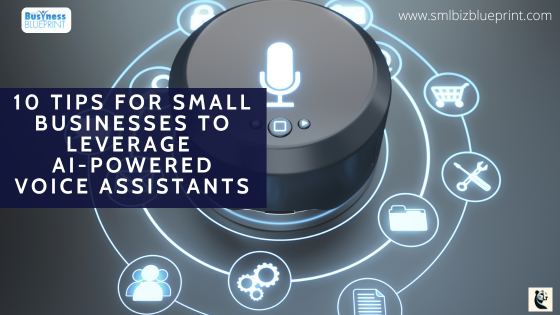Today, small businesses must leverage every tool to stay competitive.
One powerful resource that is gaining traction is the use of AI-powered voice assistants. These intelligent tools offer a range of capabilities that can enhance customer service, streamline operations, and boost productivity.
This blog post will explore how small businesses can use these advanced technologies.
From improving customer interactions to automating routine tasks, we will provide practical tips and strategies to help your business thrive in an increasingly competitive market.
Let’s explore the world of AI voice assistants and discover how they can transform small business operations.

#1 What Are AI-Powered Voice Assistants and How Do They Work for Small Businesses?
AI-powered voice assistants are advanced software applications that use artificial intelligence and natural language processing (NLP) to understand and respond to voice commands.
These assistants, such as Amazon Alexa, Google Assistant, and Apple Siri, are designed to perform various tasks, from answering customer inquiries to managing appointments and providing personalised recommendations.
Introduction to AI Voice Assistants
AI voice assistants have become integral parts of many households and businesses. They process voice inputs, interpret commands, and execute tasks based on pre-programmed algorithms and machine learning models.
This technology can be a game-changer for small businesses, providing capabilities that were once only accessible to larger enterprises.
Key Features and Functionalities
AI voice assistants come equipped with several key features that make them invaluable for small businesses:
- Voice Command Response: They can understand and respond to spoken queries, making interactions more natural and efficient.
- Task Automation: Voice assistants can automate repetitive tasks such as scheduling meetings, sending reminders, and managing to-do lists.
- Information Retrieval: They can quickly retrieve and relay information, whether it’s details about business operations or customer data.
- Integration with Other Systems: Many AI voice assistants can integrate with existing business tools and systems, enhancing their functionality and ease of use.
Examples of Popular AI Voice Assistants
Several AI voice assistants are popular in the market today, each with its unique strengths:
- Amazon Alexa: Known for its wide range of skills and integrations with smart devices, Alexa can help businesses manage tasks like inventory control and customer service.
- Google Assistant: Renowned for its superior search capabilities, Google Assistant can assist with everything from finding information online to managing schedules.
- Apple Siri: Integrated deeply into Apple’s ecosystem, Siri can help with tasks such as sending messages, setting reminders, and providing directions.
The adoption of AI voice assistants is growing rapidly. By 2025, the global voice assistant market will reach $19.6 billion (Source: MarketsandMarkets).
This growth is driven by the increasing capabilities of these assistants and the expanding range of applications they support.
Integrating AI-powered voice assistants can significantly improve efficiency and customer satisfaction for small businesses.
These tools can help small businesses compete with larger enterprises and stay ahead in the digital age by automating routine tasks and enhancing customer interactions.
#2 Enhancing Customer Service with AI Voice Assistants
Customer service is a critical aspect of any small business, and AI-powered voice assistants can significantly enhance the quality and efficiency of customer interactions.
By leveraging these advanced tools, small businesses can provide personalised, timely, and effective customer service that meets and exceeds customer expectations.
Personalised Customer Interactions
AI voice assistants are designed to offer each customer a personalized experience. They can remember customer preferences, previous interactions, and specific details, enabling them to provide tailored service.
For example, if a customer frequently orders the same product, the voice assistant can recognise this pattern and suggest reordering when the customer makes an inquiry.
Example:
A retail store using Amazon Alexa can offer personalised product recommendations based on a customer’s past purchases and preferences, enhancing the shopping experience and increasing customer satisfaction.
24/7 Support and Availability
One of the standout features of AI voice assistants is their ability to operate around the clock. Unlike human employees, voice assistants do not require breaks or sleep, which means they can provide continuous customer support.
This ensures that customer inquiries are addressed promptly, regardless of the time of day, leading to higher satisfaction and loyalty.
Example:
A small e-commerce business using Google Assistant can offer 24/7 customer support, answering questions about product availability, order status, and return policies, even outside regular business hours.
Many small businesses have successfully implemented AI voice assistants to improve customer service. For instance, a local coffee shop might use a voice assistant to handle customer orders and provide information about daily specials, reducing wait times and improving service efficiency.
A boutique hotel could use Apple Siri to assist guests with room service requests, booking spa appointments, and providing information about local attractions. This would enhance the guest experience and allow staff to focus on more complex tasks.
Compelling statistics back the positive impact of AI voice assistants on customer service. According to a Microsoft report, 77% of customers view companies more positively if they offer proactive customer service notifications.
Additionally, businesses implementing AI for customer service can achieve up to a 30% increase in customer satisfaction rates.
By incorporating AI-powered voice assistants into their customer service strategy, small businesses can offer a higher level of service that meets the needs of today’s tech-savvy consumers.
These tools enable businesses to provide personalised, efficient, and round-the-clock support, helping them to stand out in a competitive market and build strong, loyal customer relationships.
#3 The Benefits of Integrating AI Voice Assistants into Small Business Operations
Integrating AI-powered voice assistants into small business operations can yield numerous benefits, from streamlining processes to cutting costs. These advanced tools help small businesses operate more efficiently and effectively, allowing them to compete with larger enterprises.
Streamlined Processes
AI voice assistants excel at automating repetitive and time-consuming tasks, which helps streamline business operations. By handling routine inquiries, managing schedules, and organising data, voice assistants free up valuable time for business owners and employees to focus on more strategic activities.
Example:
A small law firm might use Google Assistant to schedule client meetings, send reminders, and manage deadlines, reducing the administrative burden on staff.
Cost Savings and Efficiency
Implementing AI voice assistants can lead to significant cost savings for small businesses.
Businesses can reduce labour costs while maintaining or improving service quality by automating tasks that would otherwise require additional staff. Moreover, the efficiency gains from AI can translate into faster turnaround times and improved customer satisfaction.
Example:
A local restaurant could use Amazon Alexa to manage reservations and order processing, reducing the need for additional front-of-house staff. This would lead to cost savings and more efficient operations.
Many small businesses have successfully integrated AI voice assistants into their daily operations, achieving notable efficiency and service quality improvements.
A small medical practice could use Apple Siri to manage patient appointments, send appointment reminders, and follow up on patient inquiries. This integration has streamlined the administrative process, allowing healthcare professionals to focus more on patient care.
Research indicates that businesses adopting AI technologies can achieve significant productivity improvements.
According to Accenture, businesses that integrate AI can improve productivity by up to 40%. This boost in productivity can be a game-changer for small businesses, enabling them to accomplish more with fewer resources.
How AI Voice Assistants Free Up Time for Strategic Tasks
By taking over routine and administrative tasks, AI voice assistants allow business owners and employees to concentrate on activities that directly contribute to growth and innovation. This can include developing new products or services, enhancing marketing strategies, and building stronger customer relationships.
A small marketing agency could use Google Assistant to handle client inquiries and schedule consultations, allowing the team to dedicate more time to creating impactful marketing campaigns.
Integrating AI voice assistants into small business operations offers substantial benefits, including streamlined processes, cost savings, and increased efficiency.
By automating routine tasks, these intelligent tools free up time and resources, enabling small businesses to focus on strategic growth initiatives.
As AI technology advances, the potential for small businesses to use voice assistants to gain competitive advantage will only grow.

#4 Using AI Voice Assistants for Marketing and Promotions
AI-powered voice assistants are revolutionising the way small businesses approach marketing and promotions.
By leveraging these tools, businesses can execute targeted marketing campaigns, engage with customers in real-time, and create personalised experiences that drive brand loyalty and sales.
Targeted Marketing Campaigns
AI voice assistants can gather and analyse customer data, providing valuable insights that help businesses tailor their marketing efforts. By understanding customer preferences and behaviours, businesses can design targeted campaigns that resonate more deeply with their audience.
Example:
A small fashion boutique could track customer purchase histories and preferences using Amazon Alexa. This data allows the boutique to send personalised promotions and product recommendations, increasing the likelihood of repeat purchases.
Real-Time Customer Engagement
Voice assistants enable businesses to interact with customers in real time, offering immediate responses to inquiries and promotions.
This instant engagement can significantly enhance the customer experience, making customers feel valued and increasing their likelihood of purchasing.
A coffee shop could use Google Assistant to inform customers about daily specials and loyalty program updates. When a customer asks about available promotions, the assistant provides real-time information, encouraging them to take advantage of the offers.
AI-Driven Marketing Initiatives
Many small businesses have successfully incorporated AI voice assistants into their marketing strategies, and they have seen notable improvements in customer engagement and sales.
A small online retailer could use Apple Siri to send personalised notifications about new arrivals and exclusive sales events.
By leveraging voice assistants for direct communication, the retailer has seen a 20% increase in customer engagement and a corresponding boost in sales.
Compelling data support the effectiveness of AI-driven marketing. According to Adobe, 52% of smart speaker owners are open to receiving information about deals, sales, and promotions from brands.
This openness presents a significant opportunity for businesses to engage customers through voice assistants.
Creating Personalized Customer Experiences
Voice assistants excel at creating personalised customer experiences, which are key to building brand loyalty.
Businesses can make customers feel understood and appreciated by offering recommendations based on individual preferences and past interactions.
A local grocery store could use Amazon Alexa to provide personalised shopping lists and recipe suggestions based on a customer’s purchase history. This personalized service would enhance the shopping experience and encourage customers to return.
Using AI-powered voice assistants for marketing and promotions offers small businesses a unique opportunity to engage customers meaningfully.
Businesses can enhance their marketing efforts and drive sales by executing targeted marketing campaigns, providing real-time customer engagement, and creating personalised experiences.
As AI technology continues to evolve, the potential for voice assistants to transform small business marketing will only increase, making them an essential tool in the modern marketing toolkit.
#5 Automating Routine Tasks with AI Voice Assistants
Time is one of the most valuable resources for small businesses. AI-powered voice assistants can help automate routine tasks, freeing business owners and employees time to focus on higher-value activities.
These tools can significantly enhance productivity and accuracy by handling everyday operations efficiently.
Appointment Scheduling and Reminders
One of the most practical applications of AI voice assistants is automating appointment scheduling and sending reminders.
This feature saves time and reduces the likelihood of missed appointments, helping businesses maintain a smooth operation.
A small dental clinic could use Google Assistant to schedule patient appointments, send confirmation messages, and remind patients of upcoming visits. This automation would help reduce no-shows and ensure the clinic ran efficiently.
Managing Customer Inquiries
AI voice assistants can handle various customer inquiries, responding instantly to common questions. This capability frees up human resources for more complex tasks and improves customer experience by providing quick and accurate information.
A local fitness studio could use Amazon Alexa to answer frequently asked questions about class schedules, membership fees, and facility hours. Customers receive immediate responses, reducing the need for staff to handle these routine inquiries.
Reducing Human Error and Improving Accuracy
Automation through AI voice assistants minimises the risk of human error in routine tasks.
Whether it’s data entry, scheduling, or customer service, these tools ensure tasks are completed accurately and consistently.
A small accounting firm could use Apple Siri to manage client appointments and deadlines, ensuring that all important dates are tracked and met without errors. This reliability helps build trust and credibility with clients.
Many small businesses have successfully implemented AI voice assistants to automate their operations, significantly improving efficiency and service quality.
A busy real estate agency could use Google Assistant to manage property viewings and client follow-ups. By automating these tasks, the agency can handle more clients and properties, increasing its overall productivity and revenue.
Research supports the efficiency gains from automating tasks with AI. According to Deloitte, 62% of organisations are planning to implement AI to handle customer inquiries within the next 1-2 years.
This trend highlights the growing recognition of AI’s potential to streamline business operations.
How AI Voice Assistants Enhance Productivity
By automating routine tasks, AI voice assistants allow small businesses to reallocate their human resources to more strategic initiatives.
This shift improves productivity and enhances employee satisfaction by reducing the burden of mundane tasks.
A local bakery could use Amazon Alexa to manage inventory and reorder supplies. This automation ensures the bakery always has the necessary ingredients without the staff needing to monitor stock levels constantly.
Automating routine tasks with AI-powered voice assistants offers substantial benefits for small businesses. From managing appointments and handling customer inquiries to reducing human error, these intelligent tools enhance efficiency and productivity.
By leveraging AI for routine operations, small businesses can focus more on growth and strategic activities, ultimately driving success in a competitive market.
#6 Managing Appointments and Bookings with Ease
Managing appointments and bookings is one of the most time-consuming tasks for many small businesses.
AI-powered voice assistants can simplify this process, ensuring businesses operate smoothly and efficiently.
By automating appointment scheduling and reminders, these tools reduce the administrative burden and enhance customer satisfaction.
Simplifying Reservation Systems
AI voice assistants can streamline the reservation process by handling multiple bookings simultaneously without errors. This capability is particularly beneficial for businesses that rely heavily on appointments, such as salons, medical practices, and restaurants.
A beauty salon could use Amazon Alexa to manage client appointments. Customers can book appointments through voice commands, and Alexa ensures no scheduling conflicts, making the process seamless and efficient.
Reducing No-shows and Cancellations
Automated reminders are a powerful feature of AI voice assistants. By sending timely reminders to customers about their appointments, these tools can significantly reduce the number of no-shows and last-minute cancellations, ensuring a more consistent workflow.
A small yoga studio could automatically use Google Assistant to remind clients about upcoming classes. This would reduce the number of missed sessions and help maintain a steady flow of attendees.
Integration with Existing Booking Systems
AI voice assistants can be integrated with existing booking and scheduling systems, making it easy for businesses to adopt this technology without overhauling their current setup.
This integration ensures that all appointments are synchronised and managed efficiently.
A local restaurant could integrate Apple Siri with its online reservation system. Customers can book tables via voice commands, and Siri updates the restaurant’s reservation database in real time, ensuring accuracy and avoiding double bookings.
Many small businesses have successfully implemented AI voice assistants to manage appointments and bookings, improving efficiency and customer satisfaction.
A dental clinic could use Google Assistant to schedule patient visits and send reminders. This automation has reduced administrative workload and improved patient attendance rates, allowing staff to focus more on patient care.
Research supports the benefits of using AI for appointment management. According to BusinessWire, AI in appointment scheduling can reduce missed appointments by up to 80%.
This significant reduction can lead to better resource utilisation and increased business revenue.
Simplifying the Booking Process for Customers
AI voice assistants make booking more convenient for customers, allowing them to schedule appointments through simple voice commands.
This ease of use can enhance the customer experience and increase loyalty.
A car repair shop could use Amazon Alexa to book service appointments. Customers can easily schedule their car repairs by speaking to Alexa, providing a hassle-free experience that encourages repeat business.
Managing appointments and bookings with AI-powered voice assistants offers numerous advantages for small businesses.
These tools enhance operational efficiency and customer satisfaction by simplifying reservation systems, reducing no-shows and cancellations, and integrating seamlessly with existing systems.
Leveraging AI for appointment management allows small businesses to focus more on delivering excellent service and growing operations.

#7 Cost-Effective AI Voice Assistants for Small Businesses
Investing in technology can be a daunting prospect for small businesses, especially when budgets are tight. However, AI-powered voice assistants offer a cost-effective solution that can deliver significant returns on investment.
By carefully selecting and implementing these tools, small businesses can enhance their operations without breaking the bank.
Budget-Friendly Options
Several affordable AI voice assistant devices and software solutions are available to cater to small businesses’ needs. These options provide robust features at a fraction of the cost of more comprehensive enterprise solutions.
Amazon Echo Dot and Google Nest Mini are budget-friendly devices that offer powerful AI capabilities suitable for small business environments. These devices can handle tasks like managing schedules, answering customer inquiries, and automating routine tasks.
ROI and Long-Term Savings
The initial investment in AI voice assistants can lead to long-term savings by reducing labour costs and improving efficiency. Automating repetitive tasks allows businesses to allocate human resources more effectively, focusing on activities that drive growth and profitability.
A small retail store could use Apple Siri to manage inventory and track sales. Automating these tasks reduces the need for additional staff, leading to significant cost savings over time.
Comparing Costs and Benefits
When choosing an AI voice assistant, comparing the costs and benefits of different options is essential. Consider the device’s capabilities, integration with existing systems, and ongoing maintenance costs.
A comparison between Amazon Alexa and Google Assistant might reveal that while both offer similar functionalities, one might integrate better with the specific software the business uses, leading to greater efficiency and cost savings.
Many small businesses have successfully implemented cost-effective AI voice assistants, reaping substantial benefits without a hefty price tag.
A small law office could handle client scheduling and reminders using Google Assistant. The office has seen reduced administrative overhead and increased client satisfaction, all while keeping costs low.
Research indicates that adopting AI technologies can result in significant cost savings. According to PwC, 30% of businesses see cost savings from AI within the first year of implementation.
This statistic highlights the potential for small businesses to benefit financially from integrating AI voice assistants.
Making the Right Choice for Your Business
To ensure you select the most cost-effective AI voice assistant, consider your business’s specific needs and how the technology can address them.
Look for devices that offer the best balance of features and affordability.
A small bakery might prioritise an AI voice assistant that excels in managing inventory and automating order processing, ensuring that the device meets its specific operational needs without unnecessary expenses.
AI-powered voice assistants offer a cost-effective solution for small businesses looking to enhance their operations and improve efficiency.
Small businesses can make smart investments in AI technology by choosing budget-friendly options, focusing on long-term savings, and carefully comparing the costs and benefits.
These tools streamline operations and contribute significant cost savings, making them valuable to any small business’s technological toolkit.
#8 Enhancing In-Store Customer Experience with AI Voice Assistants
Creating an exceptional in-store customer experience is crucial for small businesses to attract and retain customers.
AI-powered voice assistants can enhance this experience by providing interactive, personalised, and efficient service that meets modern consumer expectations.
Interactive Shopping Assistance
AI voice assistants can transform the in-store shopping experience by providing real-time assistance to customers.
They can answer product questions, guide customers to specific items, and even help make purchasing decisions.
A small electronics store could place Amazon Alexa devices throughout the store. Customers could ask Alexa for product information, such as specifications, prices, and availability, without finding a sales associate.
Personalised Recommendations
Voice assistants can offer personalised product recommendations based on customer preferences and purchase history. This level of personalisation can enhance the shopping experience and increase the likelihood of additional sales.
A clothing boutique could use Google Assistant to suggest outfits based on a customer’s past purchases and style preferences. When a customer asks for recommendations, Google Assistant can provide tailored suggestions, making the shopping experience more enjoyable and relevant.
Many small businesses have successfully integrated AI voice assistants into their in-store environments, providing customers with a more engaging and efficient shopping experience.
A small home improvement store could use Apple Siri to assist customers with finding the right tools and materials. Siri can provide detailed product information, including usage tips and availability, helping customers make informed decisions quickly.
Data supports AI voice assistants’ positive impact on the in-store customer experience.
According to Accenture, 60% of consumers are willing to share data to receive personalised offers and services. This willingness indicates a strong preference for personalised shopping experiences, which AI voice assistants can deliver.
Creating a Seamless Shopping Journey
Voice assistants can help create a seamless shopping journey by integrating with other technologies, such as mobile apps and online platforms.
This integration ensures that customers receive consistent and coherent service across all touchpoints.
A local grocery store could integrate Amazon Alexa with its mobile app, allowing customers to add items to their shopping lists through voice commands.
When they arrive at the store, Alexa can guide them to the exact locations of the items, streamlining the shopping process.
Improving Customer Satisfaction and Loyalty
AI voice assistants can significantly improve customer satisfaction and loyalty by providing quick, accurate, personalized assistance. Customers with positive in-store experiences are likelier to return and recommend the business to others.
A small bookshop could use Google Assistant to help customers find books and make personalised reading recommendations. This personalised service enhances the customer’s shopping experience, making them more likely to become repeat customers.
Integrating AI-powered voice assistants into the in-store environment offers numerous benefits for small businesses. By providing interactive shopping assistance, personalised recommendations, and a seamless shopping journey, these tools enhance the overall customer experience.
Improved customer satisfaction and loyalty can drive business growth and success in a competitive market.
Embracing AI voice assistants, in-store is a smart strategy for small businesses aiming to create memorable and engaging shopping experiences.
#9 Boosting Productivity Through AI Voice Assistants
In the competitive landscape of small businesses, maximising productivity is key to staying ahead.
AI-powered voice assistants can significantly boost productivity by automating routine tasks, managing time efficiently, and enabling staff to focus on higher-value activities.
Here’s how small businesses can leverage these intelligent tools to enhance their productivity.
Task Management and Delegation
AI voice assistants are adept at managing to-do lists, setting reminders, and delegating tasks. By organising daily activities and ensuring that nothing falls through the cracks, these tools help small businesses run smoothly.
A small digital marketing agency could use Google Assistant to manage project deadlines, assign tasks to team members, and set reminders for important meetings.
This organized approach helps the team stay on track and consistently meet client expectations.
Time-Saving Automation
Voice assistants can automate various routine tasks, freeing up time for employees to focus on more strategic work. This automation can include scheduling meetings, sending follow-up emails, and managing data entry.
A local café could automate inventory checks and reorder supplies using Amazon Alexa.
Alexa can track stock levels and order ingredients before they run out, ensuring that the café never experiences shortages and that employees can focus on serving customers.
Many small businesses have successfully implemented AI voice assistants to boost their productivity, allowing them to achieve more with fewer resources.
A small consulting firm could use Apple Siri to handle administrative tasks such as booking travel, scheduling client calls, and managing calendars. This automation has freed up significant time for consultants to focus on client strategy and business development.
Research supports the productivity gains achievable through AI implementation.
According to McKinsey, AI can automate tasks and save businesses up to 20-40% in labour costs. These substantial savings can be redirected to areas that drive growth and innovation.
How AI Can Handle Repetitive Tasks
AI voice assistants excel at handling repetitive tasks that are prone to human error.
By automating these activities, businesses can ensure greater accuracy and consistency, improving overall efficiency.
A small accounting firm could use Google Assistant to manage client invoicing and payment reminders. This automation ensures that invoices are sent out on time and follow-ups are conducted systematically, improving cash flow and reducing administrative workload.
Enhancing Employee Focus on Core Business Activities
By taking over mundane tasks, AI voice assistants allow employees to dedicate more time to core business activities that require human creativity and strategic thinking.
This shift not only enhances productivity but also improves job satisfaction.
A startup could use Amazon Alexa to manage daily operations such as setting up conference calls, managing project timelines, and providing weather updates for travel plans.
This allows the team to concentrate on product development and market strategies.
AI-powered voice assistants are invaluable tools for boosting productivity in small businesses. By automating routine tasks, managing time efficiently, and enabling staff to focus on higher-value activities, these tools help businesses operate more effectively and competitively.
Implementing AI voice assistants can lead to significant labour cost savings and improved overall efficiency, making them a strategic investment for small businesses aiming to maximise their productivity and growth potential.
#10 Addressing Security Considerations for AI Voice Assistants
While AI-powered voice assistants offer numerous benefits for small businesses, addressing security considerations is crucial to protect sensitive data and ensure privacy.
Implementing best practices for data security and understanding potential risks can help businesses use AI voice assistants safely and effectively.
Ensuring Data Privacy and Protection
AI voice assistants often handle sensitive information, including customer details and business data. Protecting this data from unauthorised access is paramount.
A small financial advisory firm could use Google Assistant to schedule client meetings and manage financial reports. The firm implements robust encryption and access controls to protect sensitive client data, ensuring that only authorised personnel can access the information.
Implementing Best Practices
Businesses should adopt best practices, such as regular updates, secure networks, and comprehensive employee training, to maximize the security of AI voice assistants.
Regular Updates: Ensure the voice assistant’s software is always up-to-date with security patches and features.
Secure Networks: Use secure Wi-Fi networks and implement strong password policies to prevent unauthorised access.
Employee Training: Educate employees on the importance of data security and best practices for using AI voice assistants safely.
Understanding and Mitigating Potential Risks
Businesses must be aware of the potential risks associated with AI voice assistants and take steps to mitigate them.
- Common risks include data breaches, unauthorised access, and eavesdropping.
- Data Breaches: Ensure data is encrypted in transit and at rest to protect it from breaches.
- Unauthorised Access: Implement multi-factor authentication (MFA) to add an extra layer of security for accessing sensitive data.
- Eavesdropping: Use voice recognition technology to ensure the voice assistant only responds to authorised users.
Secure Implementation
Many small businesses have successfully implemented AI voice assistants while maintaining high-security standards.
A medical clinic could use Amazon Alexa to manage patient appointments and reminders. The clinic ensures that all data is encrypted and accessed through secure, authenticated devices to protect patient confidentiality.
Statistics underscore the importance of data security.
According to PwC, 88% of customers say the extent to which they can trust a company with their data determines their willingness to buy. This highlights the need for businesses to prioritise data security to maintain customer trust.
Secure Use
By following best practices for secure use, small businesses can effectively mitigate risks and ensure the safe deployment of AI voice assistants.
A small retail store could use Apple Siri to manage inventory and customer orders. The store implements secure network protocols and regularly updates its devices to protect customer data and business information.
Addressing security considerations for AI voice assistants is crucial for small businesses leveraging this technology.
Businesses can use AI voice assistants safely and effectively by ensuring data privacy and protection, implementing best practices, and understanding potential risks.
Prioritising security protects sensitive information and helps maintain customer trust and confidence, making it a vital component of any AI deployment strategy.
Conclusion
AI-powered voice assistants are transforming the landscape for small businesses, offering a range of benefits that can significantly enhance operations, customer service, and productivity.
By understanding and leveraging these advanced tools, small businesses can compete more effectively with larger enterprises and provide exceptional customer service.
Summary of Main Points:
- Introduction to AI Voice Assistants: Understanding their capabilities and potential impact on small businesses.
- Enhancing Customer Service: Providing personalised, 24/7 support that improves customer satisfaction.
- Operational Benefits: Streamlining processes, reducing costs, and freeing time for strategic tasks.
- Marketing and Promotions: Using AI to execute targeted campaigns and engage customers in real time.
- Automating Routine Tasks: Increasing efficiency by handling repetitive activities with accuracy.
- Managing Appointments and Bookings: Simplifying scheduling processes and reducing no-shows with automated reminders.
- Cost-Effective Solutions: Select budget-friendly AI voice assistants with significant ROI and long-term savings.
- Enhancing In-Store Experiences: Providing interactive and personalised shopping assistance to boost customer satisfaction.
- Boosting Productivity: Allowing employees to focus on high-value tasks by automating mundane activities.
- Addressing Security Considerations: Ensuring data privacy and protection while mitigating potential risks.
Small businesses can enhance efficiency, improve customer experiences, and drive growth by integrating AI voice assistants into their operations.
These tools streamline everyday tasks and offer powerful capabilities for marketing, customer service, and in-store engagement.
Now is the time to explore the potential of AI-powered voice assistants for your small business.
Start by identifying the areas where these tools can make the most significant impact and choosing the solutions that align with your business needs.
Whether it’s automating routine tasks, enhancing customer interactions, or boosting productivity, AI voice assistants can be a game-changer for your business.
Embrace this technology to stay competitive, improve efficiency, and deliver outstanding customer service.
Take the first step today and discover how AI voice assistants can transform your small business operations.
Begin by researching the best AI voice assistant options available and implement a strategy to help you harness this innovative technology’s full potential.
Your business’s future success depends on staying ahead of the curve, and AI voice assistants are the perfect tool to help you achieve that goal.
FAQs
Q1. What are AI-powered voice assistants, and how can they benefit my small business?
A1: AI-powered voice assistants are advanced tools that use artificial intelligence to understand and respond to voice commands. They can benefit small businesses by automating routine tasks, improving customer service, and enhancing productivity. These assistants can schedule appointments, manage customer inquiries, and provide personalised recommendations.
Q2. How can AI voice assistants improve customer service in my business?
A2: AI voice assistants can significantly enhance customer service by offering 24/7 support, personalising customer interactions, and providing quick, accurate responses to inquiries. They can remember customer preferences and history, ensuring a more personalised and efficient service experience.
Q3. Are AI voice assistants cost-effective for small businesses?
A3: AI voice assistants can be very cost-effective for small businesses. Affordable options like Amazon Echo Dot and Google Nest Mini offer powerful features at a low cost. Additionally, automating routine tasks can lead to significant long-term savings by reducing labour costs and improving operational efficiency.
Q4. How do AI voice assistants help in marketing and promotions?
A4: AI voice assistants can gather and analyse customer data to create targeted marketing campaigns. They can also engage with customers in real-time, provide personalised promotions, and offer recommendations based on customer preferences. This helps create more effective and engaging marketing strategies.
Q5. What security measures should I take when using AI voice assistants in my business?
A5: To ensure the security of AI voice assistants, implement best practices such as using secure networks, regularly updating the software, and encrypting sensitive data. Additionally, employees should be trained on data security practices and use voice recognition technology to restrict access to authorised users.
Q6. Can AI voice assistants be integrated with my existing systems?
A6: Yes, most AI voice assistants can be integrated with business systems such as booking platforms, CRM software, and inventory management systems. This integration ensures synchronisation of all tasks and data, enhancing overall efficiency and accuracy.
Q7. How do AI voice assistants boost productivity in small businesses?
A7: AI voice assistants boost productivity by automating repetitive tasks, managing schedules, and organising daily activities. This allows employees to focus on higher-value tasks that require human creativity and strategic thinking, ultimately enhancing overall business efficiency and effectiveness.
Other Reading
Transform Customer Service: 10 AI Tips for Small Businesses
Leverage AI for Conversion Optimization: Small Business Tips




